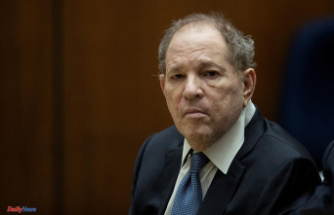It's been over a month since Sidhu Moose Wala, a rapper from Punjab in northern India was killed. He is still making headlines.
This is partly due to the manner he died and ongoing police investigations.
His music continues to be a major influence.
After a complaint by the Indian government, Moose Wala’s last song SYL was taken off YouTube. The song, which was released posthumously, talks about the decades-old dispute over river water sharing between Punjab and Haryana. It also touches on other controversial topics like Sikh militancy.
It is fitting that his legacy of asking difficult questions continues after his passing.
Moose Wala's career lasted just four years and he wrote many powerful lyrics about the history and present state of Punjab. Critics claim that the state is not perfect. It has a gritty gangster culture and corruption. His music highlighted this.
His admirers see him as a man who is engaged with social realities. His uniqueness was not only his social reality engagements, but also his divergent views of Punjabi society. His ideas were often criticized as incendiary and unsettling.
He was criticized for his affinity for guns and attempts to force listeners into difficult and uncomfortable conversations - such as YSL – which led to intense scrutiny.
Harinder Happy, a journalist from Punjab, says that "there is no doubt that [he] was a man full of contradictions." "But his style spoke to times and to living within a postmodernist society, where everyone has the freedom to define their identity in the way that they see it," says Harinder Happy.
Moose Wala was also deeply rooted in his village and home in a state where many are seeking to immigrate to other shores to find a better lifestyle.
Pritam Singh, a professor of economics at Oxford University who has closely followed Moose Wala’s music, says that "He was many, but above all he had a deep connection with the ecology in his village."
Shubhdeep Sidhu was born in an upper-caste Jatt Sikh family. He studied engineering in Canada where hundreds of thousands have emigrated.
He began his musical career there, releasing his debut album PBX 1, in October 2018, under the stage name Sidhu Moose Wala – or "Sidhuof Moosa", as he calls himself.
He maintained a distinctive hip-hop vocabulary from clothes to style that made him a global hit. His music was also swaggier and often macho, as rap music is often. He was unapologetically belligerent and sang about his love for guns, brewed about his caste, and described a put-down on his enemies.
"Moose Wala could have lived wherever he chose," Mr Happy says. He chose his village, his family and his people," Mr Happy explains. "He did more than just preserve his village identity, but he also tried to make it better, despite its many complexities.
Mansa district is where Moose Wala's home is. It is known as a backward area. It has high unemployment, one of the highest suicide rates for farmers in Punjab, and a grave groundwater crisis.
"People don’t want to be associated with the region. They want to leave and never return," Mr Happy says. "But Moose Wala was a different story. He was proud of his roots, and his music encouraged listeners to accept the village as their home.
This powerful representation is best seen in Tibeyan Da Putt ("Son of sand dunes"), which reflects the semi-arid landscapes of the region. The lyrics read, "We don't belong to noble families/ Brought up in the village and towns/ I don’t have any existence/ Yet, influential persons fear me."
Moose Wala evoked village life in song after song and encouraged his listeners to live an agrarian lifestyle. He highlighted the beauty and charm of folk music in Bambiha Boley; Never Fold he turned to tales of Robin Hood-like folk heroes, who robbed the wealthy to help the poor.
According to Mr Happy, Moose Wala was born out of the region's aspirations. He helped people cope with their differences and took pride in their identities.
He was always accessible, anyone could get to know him and he loved his followers. He says that the singer shot many of his videos in his village with his family which made him even more human."
Moose Wala's musical style evolved over time to be more politically, culturally, and socially conscious.
The most famous of these was 295, a song about freedom and speech in India. This is Section 295 of India's Penal Code. It penalizes actions that "outrage religious sentiments".
His song about India's controversial agricultural laws was a protest song in 2020. Although the lyrics, "This is none but the Punjab, which takes revenge by an open challenge", were celebrated for their power of resistance, critics said that they glorified violence and were problematic.
Moose Wala was never truly out of fashion. He continued to sneer at enemies and pose with guns.
Prof Singh says that Singh gradually moved away from the casteist metaphors, and his engagement with weapons became more measured.
He says that this thematic shift is central to the singer’s personality. "That's because Moose Wala is also a story of personal evolution. We cannot understand his popularity unless we can understand this.
These contradictions are not the end.
Prof Singh and Mr Harry both point out that Moose Wala's music was not as explicit as other rappers and his music did not objectify or degrade women.
Moose Wala doesn't avoid sentimentality in Dear Maa, a song dedicated his mother. Prof Singh said that he embraces it.
It is amazing that a man accused of being violent and masochistic is actually saying "mother, I am like your". He captures all the details so well - he may say he's as hot as the sun, but he can also be soft and feminine like her.
JayZ, a popular American rapper wrote in his memoir that Rap is made to deal with contradictions. Moose Wala's songs almost always had multiple meanings. They could be interpreted as political leanings or the complexity of identity and other questions.
Mr Happy claims that music was Moose Wala’s way of having difficult conversations, talking back, and asserting his identity.
"His music has always been about what it means to be Punjabi, and how identity can never be one-dimensional." He adds that every album, song and word is dedicated to proving this truth.
His insistence that Punjabi life was more than violence and drugs was the root of his inquiry into the Punjabi identity. Moose Wala mastered the art of mixing folk music and slick sounds to create rhymes that addressed Punjabis' lives in a way they could understand.
Prof Singh affirms, "It was his rural roots that resonated so deeply with people."
Mr Happy said that Moose Wala was the most important person to have conceived of the exciting idea that music could be a source of freedom.
When you ask difficult questions, being controversial is natural."












